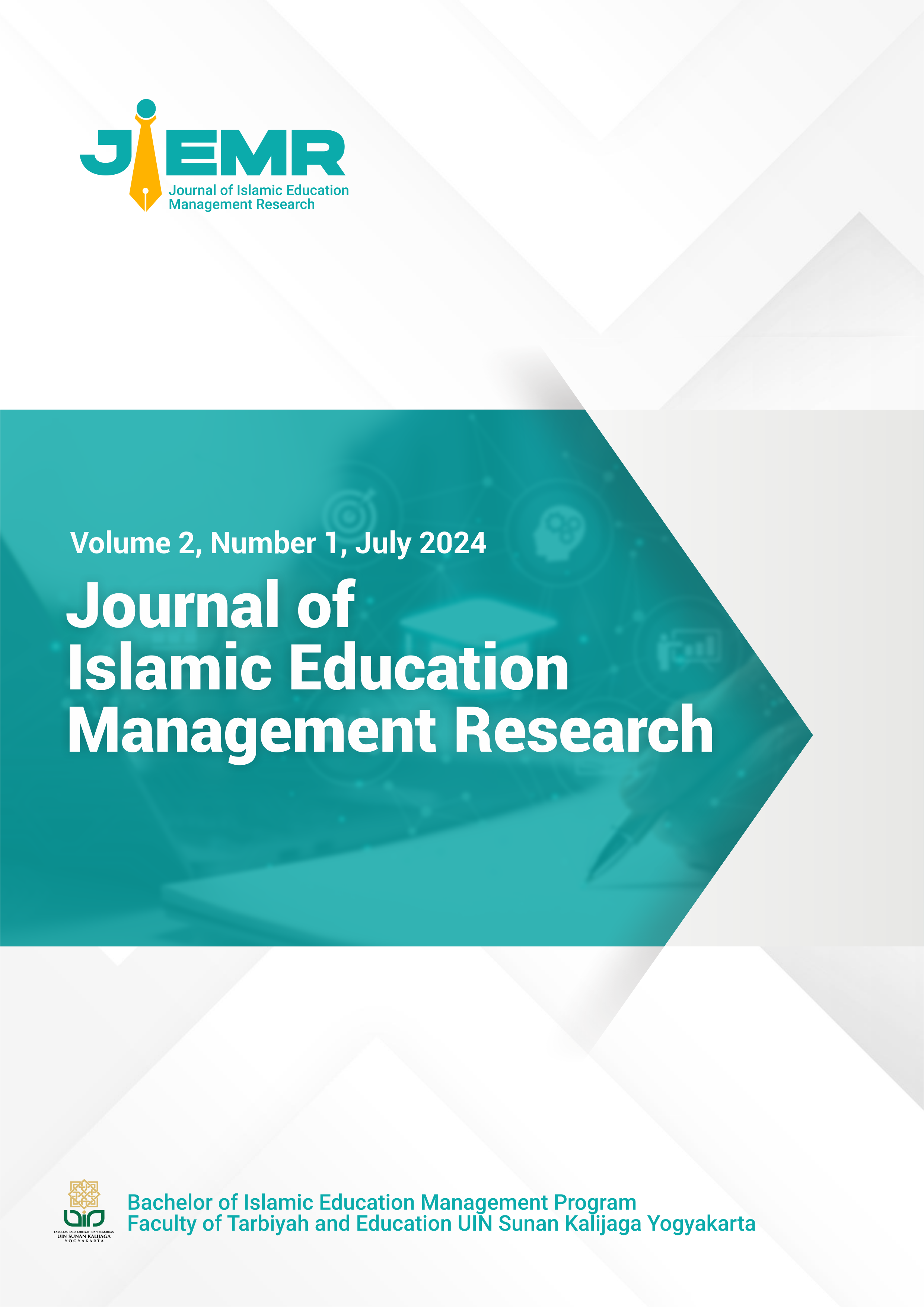Implementing Educational Programs by LAZISMU DIY to Enhance Education in Indonesia: A Qualitative Analysis
DOI:
https://doi.org/10.14421/jiemr.2024.21-10Keywords:
Capacity-Building, Educational Philanthropy, Sustainable DevelopmentAbstract
Purpose – This study aims to describe the implementation of educational programs by LAZISMU DIY in improving education in Indonesia, focusing on the effectiveness and efficiency of these philanthropic initiatives in enhancing community welfare in the Special Region of Yogyakarta.
Design/methods– Employing a qualitative-descriptive research design, data were collected through observation, semi-structured interviews, and documentation. The tools and technologies used included digital recording devices, notebooks for field notes, and cameras for photographic documentation. Data analysis involved transcription, data reduction, and the identification of key themes and patterns.
Findings – The findings reveal that LAZISMU DIY's programs, including scholarships and teacher training, significantly impact educational quality and access. These programs address financial barriers and promote sustainable educational development through a holistic approach combining financial aid and capacity-building activities.
Research implications/limitations Despite the qualitative nature of the study limiting generalizability, the results highlight the potential of strategic philanthropic interventions in fostering educational equity. Future research should incorporate quantitative methods to validate these findings and explore long-term impacts
Practical implications – The study emphasizes the importance of combining financial support with capacity-building and community engagement for effective educational interventions. This model provides a blueprint for other philanthropic organizations aiming to improve education in similar contexts.
Originality/value – This study provides valuable insights into the successful integration of financial aid, capacity-building, and community engagement by LAZISMU DIY, showcasing its significant contributions to improving education in Yogyakarta and offering a replicable model for educational philanthropy.
References
Aan Komariah, Djam’an, & Satori. (2009). Metode Penelitian Kualitatif. Alfabeta.
Ahmad, R. (2021). Jptamadmin,+620+Rahmiati+10160-10165. Jurnal Penelitian Dan Aplikasi Matematika, 5, 10160–10165.
Arikunto, S., & Cepi Abdul Jabar, S. (2009). Evaluasi Program Pendidikan (2, Ed.).
Bamualim, C. S., & Bakar, I. A. (2005). Revitalisasi Filantropi Islam: Studi Lembaga Zakat dan Wakaf di Indonesia. Pusat Bahasa dan Budaya, UIN Syarif Hidayatullah Jakarta dan Ford Foundation.
Bogdan, R. C., & Taylors, K. B. (1992). Qualitative Research for Education An Introduction to Theory and Methods. Ally and Bacon Inc.
Cahyaningrum, B. N., Untoro, W., Setiawan, A. I., & Wahyudi, L. (2024). Increasing Student Competence by Implementing Strategic Management in Indonesian Private University. Journal of Social Studies Education Research, 15(3), 173–212.
Creswell, J. W. (2014). Research design: Qualitative, quantitative, and mixed methods approaches (4th ed.). Sage.
Dianti, Y. (2017). Angewandte Chemie International Edition. 6(11), 951–952.
Iqbal, I. D., Sopwandin, I., & Hidayat, A. (2020). Implementasi Dana Ziswaf Dalam Pendidikan Islam. Jurnal Islam Nusantara, 4(1), 30–42. https://doi.org/10.33852/jurnalin.v4i1.167
Ma, C.-W., Wu, K. L.-K., & Chan, Y.-S. (2020). Vision on the internationalization of physiology education: Trends and prospects. Acta Physiologica Sinica, 72(6), 69–698. https://doi.org/10.13294/j.aps.2020.0082
Machfudz, M. (2020). Penguatan Pendidikan Melalui Lingkungan Pembelajaran Dalam Meningkatkan Kualitas Belajar Siswa Di Madrasah. FALASIFA: Jurnal Studi Keislaman, 11(2), 136–152. https://doi.org/10.36835/falasifa.v11i2.396
Olaya, D., Vásquez, J., Maldonado, S., Miranda, J., & Verbeke, W. (2020). Uplift Modeling for preventing student dropout in higher education. Decision Support Systems, 134. https://doi.org/10.1016/j.dss.2020.113320
Setyowati, A. (2017). Analisis Peranan Pengelolaan Dana ZISWAF Oleh Civil Society Dalam Pemberdayaan Ekonomi Umat (Studi Kasus Lazismu Surabaya). Jurnal Ekonomi Dan Perbankan Syariah, 2(1).
Sugiyono. (2015). Metode penelitian Pendidikan (Pendekatan Kuantitatif, Kualitatif dan R&D). CV.Alfabeta.
Suwandi, A., & Samri, Y. (2022). Peran LAZISMU (Lembaga Amil Zakat, Infaq dan Shadaqah Muhammadiyah) dalam Mengentaskan Kemiskinan Masyarakat Kota Medan. Management of Zakat and Waqf Journal (MAZAWA), 3(2), 15–30. https://doi.org/10.15642/mzw.2022.3.2.15-30
Tohari, K., & Machali, I. (2022). Manajemen Filantropi Islam Untuk Pendidikan Studi Program Jogja Cerdas Baznas Kota Yogyakarta. AN NUR: Jurnal Studi Islam, 14(1), 1–24. https://doi.org/10.37252/annur.v14i1.197
Downloads
Published
Issue
Section
License
Copyright (c) 2024 Dendi Saputra

This work is licensed under a Creative Commons Attribution-NonCommercial-ShareAlike 4.0 International License.
Copyright Notice
Authors who publish with this journal agree to the following terms:
- Authors retain copyright and grant the journal right of first publication with the work simultaneously licensed under a Creative Commons Attribution-ShareAlike 4.0 International License that allows others to copy and redistribute the material in any medium or format with an acknowledgement of the work's authorship and initial publication in this journal and also allows to remix, transform, and build upon the material for any purpose, even commercially with contributions under the same license as the original.
- Authors are able to enter into separate, additional contractual arrangements for the non-exclusive distribution of the journal's published version of the work (e.g., post it to an institutional repository or publish it in a book), with an acknowledgement of its initial publication in this journal.
- Authors are permitted and encouraged to post their work online (e.g., in institutional repositories or on their website) prior to and during the submission process, as it can lead to productive exchanges, as well as earlier and greater citation of published work.









